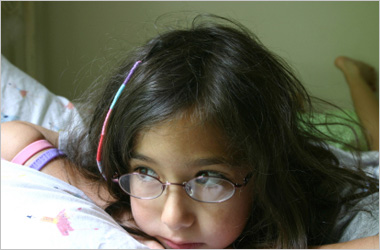Intro
Reporting Requirements
Types
Talking to
a Child
Making the
Report
Conclusion
Reporting Requirements
Reporting requirements vary slightly for a few groups. This training has been adapted specifically for UW-Extension volunteers and employees. Click the UW-Extension logo below to continue.

Physical Neglect
Define
Recognize
Practice
Listen to audio
Physical neglect is defined as the failure, refusal, or inability on the part of a caregiver, for reasons other than poverty, to provide necessary care so as to seriously endanger the physical health of the child.
Let’s look carefully at the different parts of this definition. Click on the questions below.
You can download a printable copy of the questions about physical neglect. (PDF)
Physical Neglect Scenarios

1) You volunteer at a Arts for Kids program for school-aged children during the summer. During the first ten days of the program, you notice that one student — 10-year-old Luke — has “forgotten” to bring his lunch six times the first two weeks. His clothes often look too small for him even though he is much smaller than his peers. He usually puts his head down on the desk or table and doesn’t interact with others. You create an opportunity to talk with him in private, and you learn that he is really tired because he is taking care of his five-year-old brother and four-year-old sister and that he skips lunch because otherwise there wouldn’t be enough food for his siblings. He can’t count on his mom because she sleeps “all the time,” so it is up to him to take care of things. He’s worried because they are almost out of food.
Are you required to report?
Correct: You are required to report.
At a minimum, two basic needs are not being met — adequate food and adequate supervision — even though the mother appears to be at home. Luke is trying to carry out his parents’ responsibilities. There could be a number of legitimate reasons why his Mom sleeps “all the time,” such as illness or depression, but the bottom line is the children’s basic needs are not being met. Furthermore, the status of the younger children is unknown, and there could be other serious, even emergent, unmet needs.
Incorrect: You are required to report.
At a minimum, two basic needs are not being met — adequate food and adequate supervision — even though the mother appears to be at home. Luke is trying to carry out his parents’ responsibilities. There could be a number of legitimate reasons why his Mom sleeps “all the time,” such as illness or depression, but the bottom line is the children’s basic needs are not being met. Furthermore, the status of the younger children is unknown, and there could be other serious, even emergent, unmet needs.

2) You are a UW-Extension volunteer and an adult approaches you after an educational program. She seems overwhelmed and confides that she is stressed due to some “questionable things” going on with the person who cares for her two-year-old (Stacey) while she is at class. When you ask her, she tells you the following:
-
Her daughter is coming home with bumps, scrapes and bruises on a regular basis; and when she talked to Karen, the caregiver, she was told that Stacey was just always getting into things and was “accident-prone.” But Stacey doesn’t get hurt when the student or her husband cares for her.
-
Stacey had a bad abrasion by her eye one day when her dad picked her up from day care, and Karen said “Oh, that was probably my dog.”
-
Karen cares for two other kids, both older than Stacey. Karen has begun blaming some of the bruises and scrapes on these other kids, including a bruise Stacey had on her stomach from two days ago.
-
Stacey has started crying and clinging when her mother (your student) drops her off for daycare; this morning she had a real meltdown.
Are you required to report?
Correct: You are required to report.
It’s not clear where the injuries are coming from —other kids, unsupervised play, the dog, or the caregiver — but if a two-year-old is receiving adequate supervision and care, injuries of this number should not be occurring. It is the frequency of the injuries that is concerning, as well as the location of the injuries (face and stomach), the child’s age, and the caregiver’s inadequate explanations for the injuries. You do not need to be able to tell CPS or law enforcement that you specifically suspect physical abuse or neglect or threatened maltreatment. The type of maltreatment doesn’t matter. All of the information together is reasonable cause to suspect that some form of maltreatment is occurring. And even though you haven’t seen the child yourself, you heard about these concerns while in your volunteer role.
Incorrect: You are required to report.
It’s not clear where the injuries are coming from — other kids, unsupervised play, the dog, or the caregiver — but if a two-year-old is receiving adequate supervision and care, injuries of this number should not be occurring. It is the frequency of the injuries that is concerning, as well as the location of the injuries (face and stomach), the child’s age, and the caregiver’s inadequate explanations for the injuries. You do not need to be able to tell CPS or law enforcement that you specifically suspect physical abuse or neglect or threatened maltreatment. The type of maltreatment doesn’t matter. All of the information together is reasonable cause to suspect that some form of maltreatment is occurring. And even though you haven’t seen the child yourself, you heard about these concerns while in your volunteer role.

3) While working in a community garden as a master gardener you've seen a young child from a nearby apartment building crossing the street alone to play at the playground. The street has significant traffic and the child crossed between parked cars, making him difficult for drivers to see. He played alone, totally unsupervised, attempting to climb equipment intended for older children. At one point he fell and began to cry. You saw no indication of a parent or caregiver in the area.
Are you required to report?
Correct: You are required to report.
You are required to report all instances of child abuse and neglect you observe while serving in your role as volunteer. A four-year-old child is unable to care for himself, so, at a minimum, his basic need for adequate supervision is not being met. We don’t know whether there is a caregiver in the home, but we don’t need to know that. Even if there is a caregiver in the home while the child is outside, that caregiver is not providing adequate supervision, and that lack of care seriously endangers the child’s physical health.
Incorrect: You are required to report.
You are required to report all instances of child abuse and neglect you observe while serving in your role as volunteer. A four-year-old child is unable to care for himself, so, at a minimum, his basic need for adequate supervision is not being met. We don’t know whether there is a caregiver in the home, but we don’t need to know that. Even if there is a caregiver in the home while the child is outside, that caregiver is not providing adequate supervision, and that lack of care seriously endangers the child’s physical health.

1) You are an ER nurse. A mother brings two-year-old Emma to the ER with a scald burn along the head, face, and shoulders. The mother explains to you that Emma pulled a boiling pot of spaghetti from the stove onto herself. That explanation seems to fit the burns. When you ask more details about the incident in order to provide the best medical care for Emma, the mother says she really doesn’t know because she was outside mowing the lawn. She said it was a terrible accident, but Emma had been told never to touch anything on the stove and knew better.
Are you required to report?
Correct: You are required to report.
The burn itself was accidental (and therefore is unlikely to be considered physical abuse), but it happened because the mother was not providing the level of supervision required by a two-year-old child. Therefore, there is reasonable cause to suspect that the burns were the result of neglect. The lack of necessary care (supervision) seriously endangered the physical health of the child and continues to endanger the child, as the mother has indicated that she expects the child to know how to keep herself safe.
Incorrect: You are required to report.
The burn itself was accidental (and therefore is unlikely to be considered physical abuse), but it happened because the mother was not providing the level of supervision required by a two-year-old child. Therefore, there is reasonable cause to suspect that the burns were the result of neglect. The lack of necessary care (supervision) seriously endangered the physical health of the child and continues to endanger the child, as the mother has indicated that she expects the child to know how to keep herself safe.

2) Six-year-old Lindy comes to the child care center where you are a provider and announces to you one day that she is old enough now to stay home alone. By way of proof, she says that she was at home alone the previous night because her mom “went clubbing” with her boyfriend. She was pretty scared, but her mom told her to watch TV and then just go to bed, that she was a big girl now, not a baby. Her mom wasn’t home when she fell asleep but was home when she woke up that morning.
Are you required to report?
Correct: You are required to report.
There is a lack of necessary care — in this case, supervision. A six-year-old child does not have the cognitive or emotional maturity to care for herself in that situation.
Incorrect: You are required to report.
There is a lack of necessary care — in this case, supervision. A six-year-old child does not have the cognitive or emotional maturity to care for herself in that situation.

3) Nine-year-old Luke on your soccer team is distracted and seems to have no energy. When you ask him how he is, he wants to know if you can tell him how someone can find their father. When you talk to Luke some more, you find out his mother sleeps “all the time,” that he’s been trying to make meals for his five-year-old brother and four-year-old sister, but there’s hardly any food left in the house and the money he had found to buy food is all gone now. He doesn’t want to get his mom in trouble, but he doesn’t know what to do any more. He thought maybe his father would take care of things.
Are you required to report?
Correct: You are required to report.
At a minimum, two basic needs are not being met: adequate food and adequate supervision, even though the mother appears to be at home. Luke is trying to carry out his parents’ responsibilities. There could be a number of legitimate reasons why the Mom sleeps “all the time,” such as illness or depression, but the bottom line is the children’s basic needs are not being met. Although Luke appears to be physically OK, the status of the younger children is unknown, and there could be additional serious, even emergent, unmet needs.
Incorrect: You are required to report.
At a minimum, two basic needs are not being met: adequate food and adequate supervision, even though the mother appears to be at home. Luke is trying to carry out his parents’ responsibilities. There could be a number of legitimate reasons why the Mom sleeps “all the time,” such as illness or depression, but the bottom line is the children’s basic needs are not being met. Although Luke appears to be physically OK, the status of the younger children is unknown, and there could be additional serious, even emergent, unmet needs.

4) Three-year-old Stevie comes to your child care center. He has limited speech and play skills as compared to the other children his age. When you observe him with his mother, she is affectionate with him but doesn’t spend much time directly interacting with him. You are sure he would do better if he received some stimulation at home. You encourage her to set aside time to read him books and play games with him, but you get the impression that she is not going to do that. He appears adequately fed and clothed and has no health problems beyond the normal childhood colds.
Are you required to report?
Correct: You are not required to report.
Your assessment that Stevie would benefit from his mother teaching, playing and interacting with him could very well be correct, but the absence of that stimulation does not seriously endanger his physical health. His basic needs for care and protection appear to be met, so there appears to be no neglect as defined in the law.
Incorrect: You are not required to report.
Your assessment that Stevie would benefit from his mother teaching, playing and interacting with him could very well be correct, but the absence of that stimulation does not seriously endanger his physical health. His basic needs for care and protection appear to be met, so there appears to be no neglect as defined in the law.
Make sure to visit all the tabs before continuing the course!

